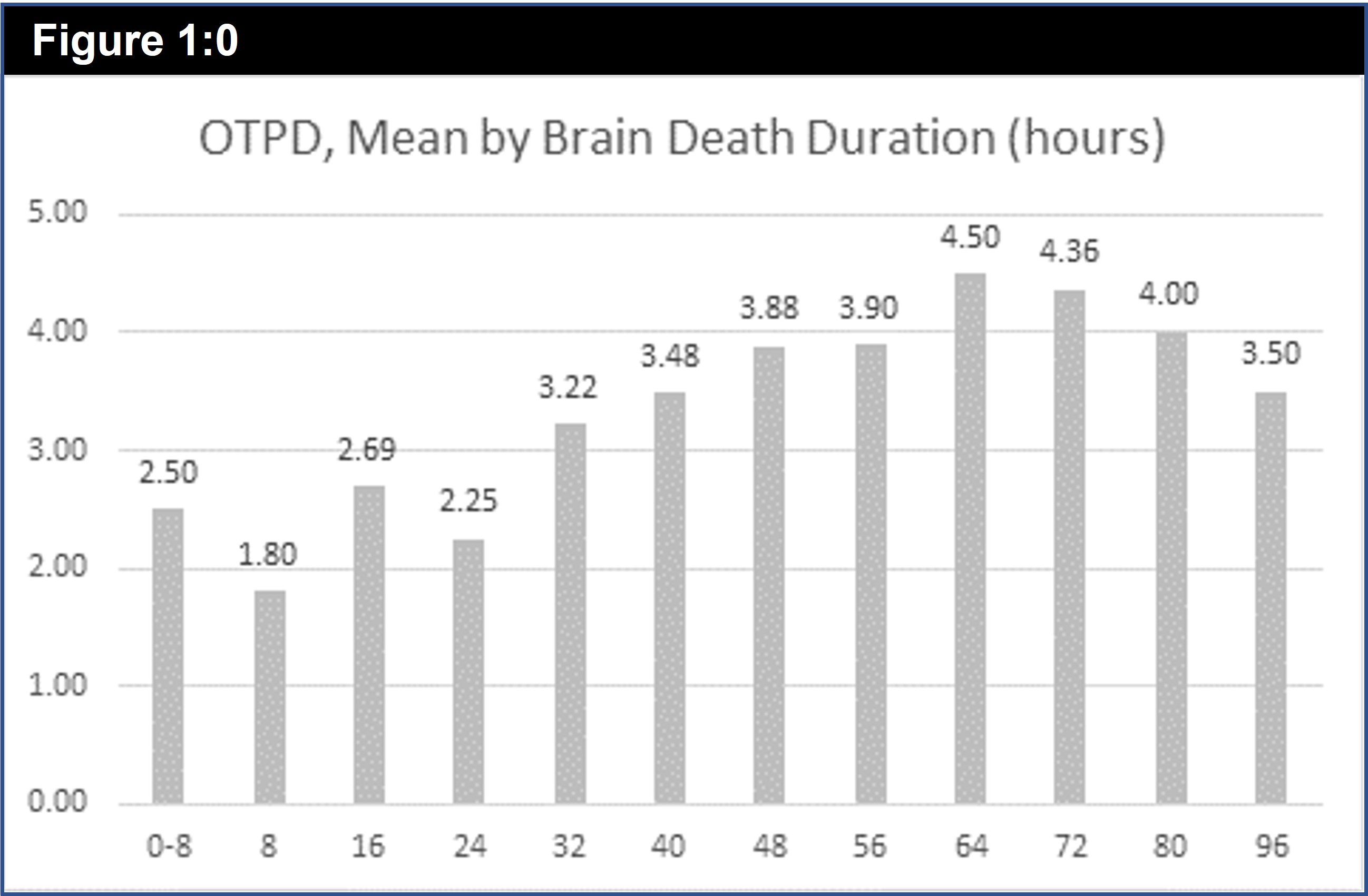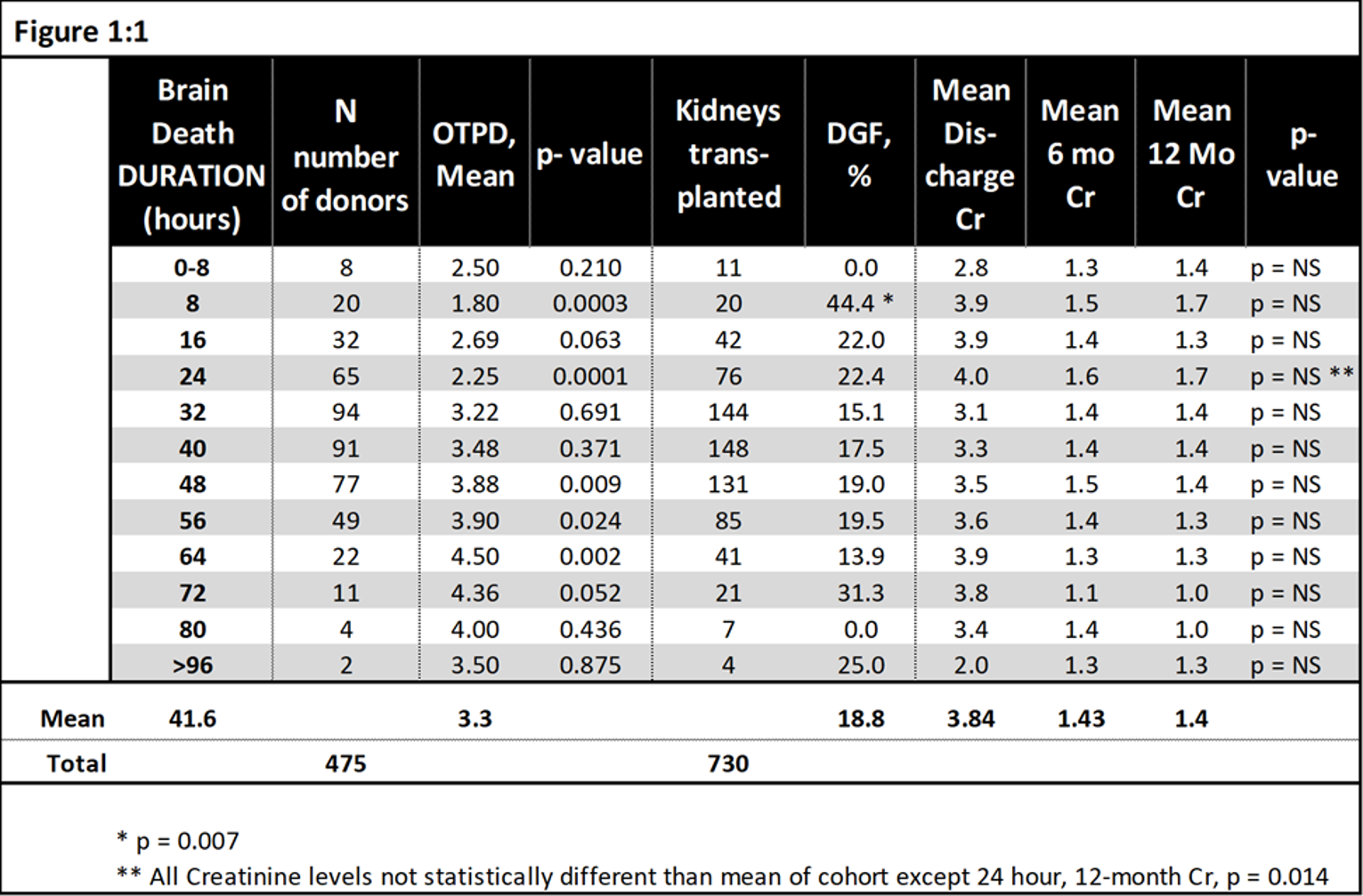Duration of Brain Death Does Not Impact Short Term Outcomes in Kidney Transplantation
1Organ Recovery, LifeShare Transplant Donor Services of Oklahoma, Oklahoma City, OK, 2LifeShare Transplant Donor Services of Oklahoma, Oklahoma City, OK, 3LifeShare Transplant Donors Services, Oklahoma City, OK
Meeting: 2022 American Transplant Congress
Abstract number: 1779
Keywords: Donation, Kidney, Outcome, Preservation
Topic: Clinical Science » Organ Inclusive » 68 - Deceased Donor Management and Intervention Research
Session Information
Session Name: Deceased Donor Management and Intervention Research
Session Type: Poster Abstract
Date: Tuesday, June 7, 2022
Session Time: 7:00pm-8:00pm
 Presentation Time: 7:00pm-8:00pm
Presentation Time: 7:00pm-8:00pm
Location: Hynes Halls C & D
Session Information
Session Time: 7:00pm-8:00pm
 Presentation Time: 7:00pm-8:00pm
Presentation Time: 7:00pm-8:00pm
Location: Hynes Hall C
*Purpose: In animal models, brain death has been shown to induce renal injury, primarily due to ischemia, inflammation, and alterations in hemodynamics. However, donor management teams often manage brain dead donors for a prolonged period to optimize organ recovery. The purpose of our study is to determine the impact of the duration of brain death on kidney function post-transplantation, and to determine if number of organs placed was impacted by duration of brain death.
*Methods: We examined all brain-dead organ donors in our OPO from January 2018 to November 2021. Duration of brain death was defined as: Time between declaration of brain death and crossclamp. Duration of brain death was stratified into 8-hour time intervals. Our OPO donor database was cross-referenced with the UNOS Organ Utilization Tool from the same period to access available 6- and 12-month outcomes for kidney recipients (N=687). One donor with 2,320 hours of brain death duration – a pregnant female who presented at 17 weeks gestation and was monitored until delivery – was excluded from the analysis.
*Results: Mean duration of brain death was 41.6 +/- 16.1 hours. Mean OTPD for the series was 3.30. In general, we observed a statistically significant increasing number of organs transplanted per donor (OTPD) as brain death duration increased, to the 64-hour mark (Fig 1:0). Mean rate of delayed graft function (DGF) for the cohort was 18.8%. The donors at 8 hours of brain death resulted in a rate of DGF of 44.4% (p=0.007). Mean serum recipient creatinine at discharge, and at 6 and 12 months; was not significantly negatively impacted by prolonged duration of brain death.
*Conclusions: In our series, duration of brain death did not impact short-term outcomes in kidney recipients. We realized an increasing number of OTPD with brain death duration up to the 64-hour mark. Transplant centers should not be discouraged from accepting kidneys from donors with prolonged duration of brain death. Organ recovery teams should take an appropriate amount of time to stabilize organ donors and to maximize organ placement.
To cite this abstract in AMA style:
Hawxby AM, Ketcham R, Orlowski JP, Squires RA, Hostetler C. Duration of Brain Death Does Not Impact Short Term Outcomes in Kidney Transplantation [abstract]. Am J Transplant. 2022; 22 (suppl 3). https://atcmeetingabstracts.com/abstract/duration-of-brain-death-does-not-impact-short-term-outcomes-in-kidney-transplantation/. Accessed July 9, 2025.« Back to 2022 American Transplant Congress


